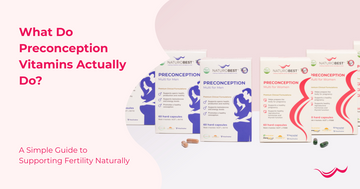Prepare for a Healthy Pregnancy (Preconception Health for Women)
by Nikki Warren on May 02, 2022

Most women want to do everything possible to prepare for a healthy pregnancy. When you fall pregnant, it’s reassuring knowing that you and your partner have put in the effort. The effort to ditch poor lifestyle habits and improve your nutrient intake.
You now have the confidence of a good outcome – a healthy pregnancy and ultimately a healthy baby. Following a preconception care plan appears to reduce the risk of miscarriage, premature labour, stillbirths and birth defects.
Research carried out in the UK with 367 couples with a previous history of reproductive problems resulted in a successful pregnancy for 327 couples. This was after following a 4-month preconception care plan. Of particular interest was the fact that none of those pregnancies resulted in a miscarriage or malformations. So what’s involved in a preconception care plan?
Detox
Most complementary medicine practitioners will recommend doing a liver and gut cleanse for at least 3 weeks of the 4-month program. A naturopath or nutritionist can assess your body burden of heavy metals and guide you through a heavy metal detox.
This will take at least 4 months, if not more. For the entire 4 months, the couple should give up alcohol. Or at the very least minimise intake to no more than 2 standard drinks no more than twice a week.
Of course, cigarettes and recreational drugs should be ditched long before you even think about conceiving a baby. Giving up coffee can be challenging, but I highly recommend it for two reasons.
Firstly, coffee is going to make you feel really ill in the first trimester when you’re suffering from morning sickness. Giving up caffeine at that time will only add to your misery as you suffer caffeine withdrawals. Secondly, coffee depletes nutrients in the body like magnesium and B vitamins and puts pressure on your adrenals.
If your adrenals are in good health, pregnancy and parenting are a lot easier. Trust me on this one. I used to be a coffee addict myself and my energy levels are a lot higher without it.
Clean diet
We have been misled by corporate companies into thinking that a healthy diet looks something like cereal or toast for breakfast. A sandwich for lunch then pasta for dinner. But this couldn’t be further from the truth.
This is a far healthier option. Some breakfast options could include a smoothie for breakfast. I use Eden’s brown rice protein powder, rice milk, frozen berries and frozen mango. Yum!
Lunch options could include salads in summer or vegetable soups in winter. It is important to make sure you add lots of avocado and seeds to your salad for some healthy fats.
Snack options throughout the day may include fruit (maximum 2 for a woman, 3 for a man per day). Other snacks could include nuts and seeds.
Dinner options may include meat or fish with rice and vegetables. Consuming a nutrient dense diet does not need to be complicated. It is recommended to try and eat organic fruit and vegetables as much as possible.
Boost nutrient stores
The entire pregnancy and breastfeeding period is a long journey. You need to prepare for it the way you might prepare for a marathon. Especially if you want to keep your energy levels up.
Iron
During the second half of pregnancy, there is a doubling of the woman’s blood volume. This means that the blood is more diluted with many nutrients including iron.
If you can boost your iron stores (ferritin) prior to conception. You are less likely to become anaemic during pregnancy. If you have good stores of iron, you can also choose to take an iron-free supplement during the first trimester.
Iron supplementation in the first trimester is known to worsen the symptoms of morning sickness. The advised daily intake of iron during pregnancy is 27mg. This is extremely hard to achieve from the diet even if you eat red meat.
Zinc
Zinc is another essential nutrient for women's health. Zinc is important during the entire preconception, prenatal and breastfeeding period.
This study reports that zinc deficiency can lead to impaired synthesis of sex hormones. It also stated it can lead to abnormal ovarian development and disruption of the menstrual cycle. Zinc deficiency may lead to recurrent miscarriage and a prolonged gestational period.
Zinc deficiency may lead to teratogenicity and stillbirths. As well as a difficult labour and pre-eclampsia. Zinc deficiency may lead to toxaemia and low birth weight.
Folate
We all know how important folate is for reducing the risk of neural tube defects. However, it is also important for egg quality and maturation, implantation, placentation, foetal growth and organ development.
This case series study showed it may be important for reducing the risk of miscarriage in women with MTHFR polymorphisms. What the study found was that 800mcg of Quatrefolic was better than 5mg of folic acid. This was for reducing the risk of miscarriage in these women.
Micronutrients
This cohort study of 18555 women without a history of infertility, showed that taking prenatal vitamins regularly reduced the risk of infertility due to ovulatory factors. Micronutrients are those needed in small amounts such as vitamins, zinc, iron, chromium, manganese and molybdenum.
Macronutrients
These are needed in relatively large amounts. Calcium and magnesium are examples of macro-minerals.
Eating 3 servings of dairy products daily alongside other calcium-rich foods is important. This may include other foods such as canned salmon with bones and sesame seeds. This can help ensure you meet your RDI of 1000mg daily.
With veganism on the rise, it might be best to supplement to help you achieve the RDI. Calcium supplements should contain magnesium, vitamin K2 and vitamin D3. Vitamin K2 is an important co-factor to help keep calcium in bones and out of arterial walls. Vitamin D3 is needed to help calcium absorption.
Lifestyle
Your lifestyle can be one of the most challenging things to change for most people. We've already covered toxic lifestyle habits like drinking alcohol, coffee and smoking but what about mind-body medicine?
The mind works similarly to a muscle. It needs training on a regular basis to function optimally. Learning how to be mindful, slow down and smell the roses might be a foreign concept to you. The fast-paced lifestyles we have nowadays aren't not very helpful for our overall health.
If you don’t have any children yet, make the most of the freedom you have. Slow down on the weekend. Enjoy each other’s company. Meditate together, do yoga together, connect physically with each other with lots of hugs, kisses and lovemaking.
How lucky are you that you’ve found a partner that you love and want to have a baby with? If you are struggling with infertility, it’s doubly important to be mindful of negative thoughts creeping in.
Common thoughts like “why is this happening to me?” and “all these other women have unplanned pregnancies, it’s not fair!” are not only unhelpful, but they may be hindering your ability to conceive.
Why is this happening to you? Because it’s part of your journey. When you come out the other side you will realise why that was meant to happen to you. Every cloud has a silver lining.
Why do other women have unplanned pregnancies at the drop of a hat? Because they aren’t thinking about falling pregnant.
Be happy with where you are right now. Remember when you were a teenager and you couldn’t wait to go out clubbing? go to a bar? or have sex for the first time?
What would tell yourself if you could go back in time? You would probably say “I know those things sound exciting, but you know what? Just enjoy the time you have now, you can wait”.
Likewise, in a few years’ time when you are worn down by the relentless job that is parenting. You will look back on this time and wish you had appreciated all the free time you had with your partner. If time is not on your side, then I understand the urgency. However it’s even more important that you train your mind to think positively.
Most couples I have helped in clinic have really struggled with the concept of following this plan for 4 months. Most of them had already been trying for months or even years. If there is one piece of wisdom I can impart from working with these couples it’s this – do not be impatient.
I had so many couples who ignored my advice and conceived within the first 2 months of working with me…. And then miscarried again. So they had to start all over again. The ones who went on to follow the plan for 4 months, would have a healthy pregnancy and a healthy baby.




